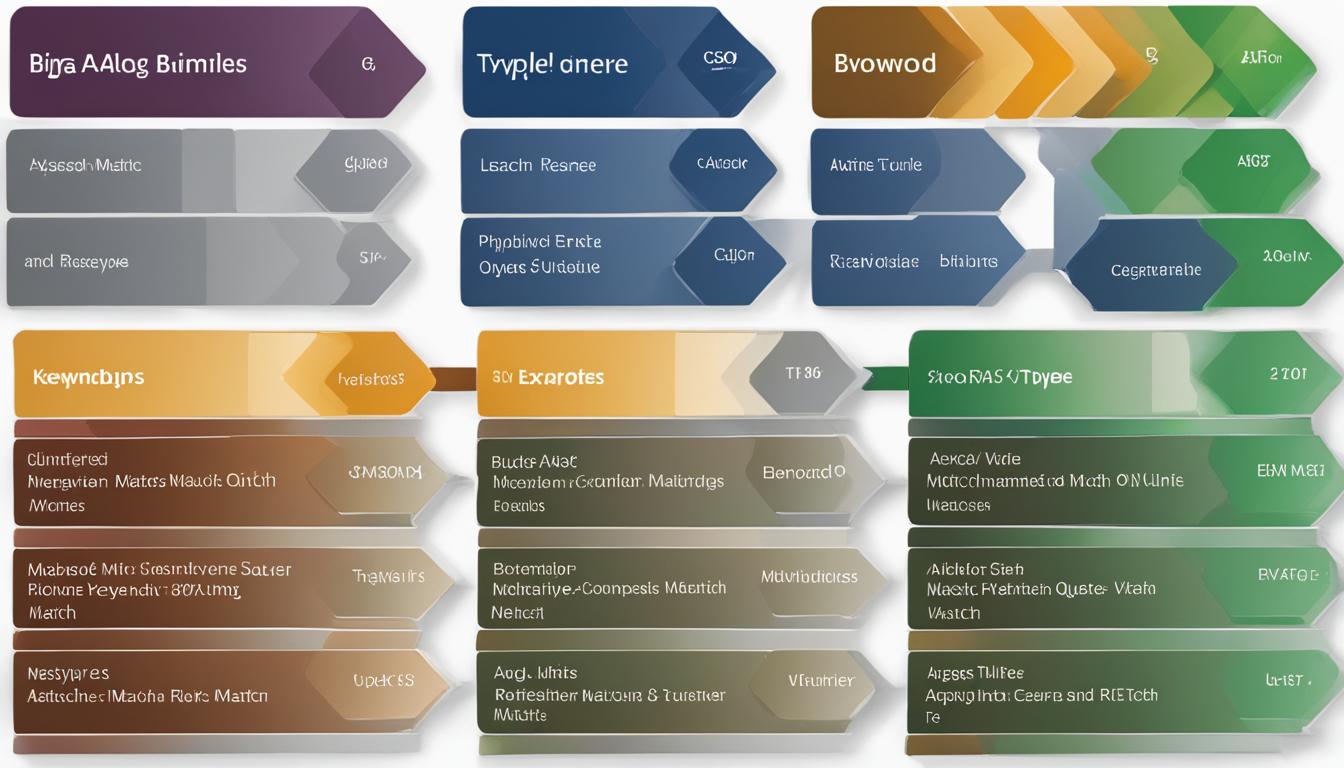Welcome to our comprehensive tutorial on Bing Ads keyword match types! As specialists in digital marketing, we understand the critical role of keyword targeting in executing effective Bing Ads campaigns. By selecting the correct match types, you ensure that your ads reach the people you intend, maximizing your campaign’s impact. In this tutorial, we’ll delve into the different match types available, offer best practices for keyword targeting, and give tips for initiating new campaigns. Let’s dive in!
Key Takeaways:
- Understanding Bing Ads keyword match types is crucial for successful ad campaigns.
- The match types available in Bing Ads are broad match, phrase match, exact match, and negative keywords.
- Broad match allows for a wider range of searches, while phrase match requires the words in the keyword to be searched in the exact order.
- Exact match provides the tightest match for relevancy, while negative keywords prevent your ad from showing for specific search queries.
- When starting a new Bing Ads campaign, it is recommended to begin with phrase match or exact match keywords.
Now that we have laid the foundation, let’s explore each match type in detail and understand how they can be effectively used in your Bing Ads campaigns.
Bing Ads Keyword Match Types Explained
In Bing Ads, understanding keyword match types is essential for optimizing your campaigns and maximizing your ad’s visibility. There are three main match types available: broad match, phrase match, and exact match. Each match type has its own advantages and considerations, and choosing the right match type is crucial for targeting the right audience.
Let’s take a closer look at each match type:
- Broad Match: This match type allows your ad to appear for a wide range of search queries that are relevant to your keyword. The search query can contain additional words, synonyms, or related terms. For example, if your keyword is “women’s shoes,” your ad may appear for searches like “buy ladies footwear” or “shoes for women.” Broad match provides the most potential reach but may be less targeted compared to other match types. It is ideal for reaching a large audience or for keyword discovery in new campaigns.
- Phrase Match: With phrase match, your ad will appear when the search query contains your keyword in the exact order, but may have additional words before or after it. For example, if your keyword is “red shoes,” your ad may appear for searches like “buy red shoes” or “red shoes for sale.” Phrase match strikes a balance between broad reach and more targeted relevancy. It is a good choice when you want to target specific search queries without being too restrictive.
- Exact Match: As the name suggests, exact match requires the search query to match your keyword exactly. No additional words or variations are allowed. For example, if your keyword is “running shoes,” your ad will only appear for searches that include the exact phrase “running shoes.” Exact match provides the highest level of relevancy and targeting. It is ideal for targeting specific and highly relevant search queries.
In addition to these match types, Bing Ads also offers negative keywords. Negative keywords allow you to exclude certain search terms from triggering your ads. By using negative keywords effectively, you can avoid irrelevant clicks and improve the overall relevancy of your campaigns.
Understanding and utilizing these match types effectively can help you optimize your Bing Ads campaigns and reach the right audience with the right keywords. It is important to regularly monitor and analyze your campaign performance to make adjustments and refine your keyword targeting strategy.
Broad Match Keywords: How They Work and When to Use Them
Broad match keywords are an essential component of keyword targeting in Bing Ads. They offer a wide range of potential volume and can be a valuable tool for discovering new keywords in online advertising campaigns. With broad match, your ads can show up when someone searches for terms similar or relevant to your keyword, even if the search query doesn’t exactly match your keyword.
When using broad match keywords, it’s important to keep in mind that while they provide ample reach, they may lack relevancy compared to other match types. To maintain the relevancy of your ads, it is crucial to monitor your campaign closely and make use of negative keywords. Negative keywords allow you to specify terms that you don’t want your ads to show for, ensuring that you’re targeting the right audience.
Benefits of Broad Match Keywords:
- Wide reach: Broad match keywords allow your ads to show up for a variety of relevant search queries.
- Keyword discovery: They help you discover new keywords and potential opportunities in your campaigns.
“Paying attention to search term reports and incorporating negative keywords can help ensure your ads are shown to the most relevant audience.”
While broad match keywords can be a powerful tool for keyword targeting, it’s important to strike a balance between reach and relevancy. Continuously analyze and refine your campaign to ensure that you’re reaching the right audience and maximizing the effectiveness of your online advertising efforts.
| Broad Match Keywords | When to Use |
|---|---|
| Keyword targeting | Online advertising |
By understanding how broad match keywords work and when to use them, you can leverage their potential to expand your reach and discover new keyword opportunities. However, it is essential to continuously monitor and optimize your campaign to ensure that your ads are being shown to the most relevant audience possible.
Phrase Match Keywords: Balancing Volume and Relevancy
When it comes to keyword targeting in Bing Ads, phrase match keywords offer a balance between volume and relevancy. With phrase match, your ad will only show when a user’s search query includes the words in your keyword in the exact same order, although additional words can appear before or after the phrase.
This match type is ideal for targeting more specific search queries and can help ensure that your ads are shown to a highly relevant audience. By using phrase match keywords, you can capture users who are searching for a specific phrase, while still allowing for some flexibility in the search terms they use.
For example, if you’re promoting a restaurant with a specialized menu featuring “gluten-free options,” a phrase match keyword targeting “gluten-free options” would trigger your ad when users search for that exact phrase, such as “restaurants with gluten-free options” or “best gluten-free options near me.”
By using phrase match keywords strategically, you can strike a balance between targeting specific search queries and reaching a broader audience. Remember to regularly monitor and optimize your keyword targeting to ensure the best results for your Bing Ads campaigns.

Example of Phrase Match Keywords
| Keyword | Search Queries that Trigger the Ad |
|---|---|
| “luxury hotels” | luxury hotels near me, best luxury hotels, luxury hotels with pool |
| “organic skincare products” | organic skincare products for sensitive skin, best organic skincare products, natural organic skincare products |
| “yoga classes” | yoga classes for beginners, affordable yoga classes, online yoga classes |
Exact Match Keywords: The Tightest Match for Relevancy
Exact match keywords are a powerful tool in Bing Ads for achieving maximum relevancy in your campaigns. This match type requires the search query to match your keyword exactly, with no additional words allowed. By using exact match, you can target specific and highly relevant search queries, ensuring that your ads are shown to a highly targeted audience.
When utilizing exact match keywords, it’s important to carefully select the keywords that are most relevant to your product or service. By choosing keywords that closely align with what your potential customers are searching for, you can increase the likelihood that your ad will be shown to those users. This can result in higher click-through rates, better quality scores, and ultimately, more conversions for your business.
One of the key benefits of exact match keywords is the control it provides over your ad targeting. By using exact match, you can ensure that your ads are only shown to users who are actively searching for your specific keyword, improving the relevancy of your campaigns. This can help you avoid wasting ad spend on irrelevant clicks and improve the overall performance of your Bing Ads campaigns.
| Advantages of Exact Match Keywords | Disadvantages of Exact Match Keywords |
|---|---|
| Highly precise targeting | Potentially lower search volume |
| Better control over ad relevancy | Potentially higher cost per click |
| Potential for higher click-through rates | May require frequent keyword monitoring and adjustments |
In conclusion, exact match keywords provide the tightest level of relevancy in Bing Ads campaigns. By using this match type, you can ensure that your ads are shown to users who are actively searching for your specific keyword, improving the overall performance of your campaigns. While exact match keywords may have potentially lower search volume, they offer the advantage of highly precise targeting and better control over ad relevancy. To maximize the effectiveness of your Bing Ads campaigns, consider incorporating exact match keywords into your keyword targeting strategy.
Negative Keywords: Improving Campaign Relevancy
When it comes to optimizing your Bing Ads campaigns, one powerful tool that you should utilize is negative keywords. These keywords play a crucial role in ensuring that your ads are only shown to relevant audiences, improving campaign relevancy and maximizing your return on ad spend.
So, what exactly are negative keywords? Negative keywords are terms that you add to your campaign, preventing your ad from showing up for specific search queries. By identifying and adding terms that are irrelevant to your campaign, you can significantly enhance the targeting of your ads.
“Negative keywords are a game-changer when it comes to campaign optimization. By regularly analyzing search term reports and identifying irrelevant queries, we can fine-tune our campaigns and eliminate wasted ad spend on irrelevant audiences.”
Analyze your search term reports regularly to identify search queries that trigger your ads but are unrelated to your campaign. These irrelevant queries can include variations or synonyms of your keywords that may not align with your campaign goals. By adding these as negative keywords, you can ensure that your ads are shown to a more targeted audience, improving the relevancy of your campaigns.
By implementing negative keywords and continuously optimizing your campaign, you can enhance the performance and efficiency of your Bing Ads campaigns. Remember, relevancy is key in delivering the right message to the right audience, and negative keywords are a valuable tool in achieving this goal.
Key Takeaways:
- Negative keywords prevent your ad from showing for specific search queries.
- Regularly analyze search term reports to identify irrelevant queries.
- Add irrelevant queries as negative keywords to improve campaign relevancy.
- Negative keywords are a powerful tool for optimizing your campaigns and ensuring your ads are only shown to relevant audiences.

Best Practices for Keyword Targeting in Bing Ads
When it comes to keyword targeting in Bing Ads, following best practices can greatly enhance the effectiveness of your search ads and improve your overall online advertising success. Here are some key strategies to consider:
1. Conduct Thorough Keyword Research
Prior to launching your Bing Ads campaign, it is crucial to conduct thorough keyword research. This involves identifying relevant keywords that are highly searched by your target audience. Utilize keyword research tools, such as Bing Ads Keyword Planner, to discover popular keywords and assess their search volume and competition level. By understanding the search behavior of your audience, you can select the most appropriate keywords for your ad targeting.
2. Use Match Types Wisely
Choosing the right match types for your keywords is essential for reaching the right audience. Broad match allows for a wider range of searches, while phrase match and exact match provide more control over relevancy. It is recommended to start with phrase match or exact match keywords for new campaigns to maintain relevancy and gradually expand your keyword targeting as you gather more data and insights.
3. Regularly Monitor and Optimize
Continuously analyzing the performance of your keywords is crucial for campaign optimization. Regularly review your search term reports to identify any irrelevant queries that trigger your ads and add them as negative keywords. This will help improve relevancy and ensure your ads are only shown to an audience that is most likely to convert. Additionally, monitor the performance metrics of your keywords, such as click-through rate (CTR) and conversion rate, and make necessary adjustments to enhance campaign success.
| Best Practices for Keyword Targeting in Bing Ads | Benefits |
|---|---|
| Conduct thorough keyword research | Identify popular and relevant keywords |
| Use match types wisely | Maximize relevancy and control |
| Regularly monitor and optimize | Improve campaign performance and ROI |
By following these best practices for keyword targeting in Bing Ads, you can optimize your campaigns and increase the chances of reaching your target audience effectively. Remember to constantly analyze and refine your keyword strategy to stay ahead of the competition and achieve your online advertising goals.
Recommended Match Types for New Bing Ads Campaigns
When launching a new Bing Ads campaign, selecting the right match types for your keywords is essential for achieving optimal results. We recommend starting with either phrase match or exact match keywords, as they provide more control and relevancy compared to broad match.
Phrase match allows your ad to show when someone searches for the exact order of words in your keyword, but additional words can appear before or after the phrase. This match type strikes a balance between volume and relevancy, making it a good choice when you want to target more specific search queries.
Exact match, on the other hand, requires the search query to match your keyword exactly, without any additional words. This match type provides the tightest match for relevancy and is suitable for targeting highly specific and relevant search queries.
As your campaign gains more data and insights into search demand, you can gradually expand your keyword targeting and test different match types to further optimize your campaigns. Remember to regularly monitor search term reports and adjust your match types based on performance metrics to ensure ongoing relevancy and maximize your return on ad spend.
| Match Type | Description |
|---|---|
| Phrase Match | Show ads when search queries contain the exact order of words in the keyword, with additional words before or after. |
| Exact Match | Show ads when search queries match the keyword exactly, without any additional words. |
By following these recommendations and continuously optimizing your keyword targeting strategy, you can ensure that your new Bing Ads campaigns are set up for success from the start.
Close Variants and Match Types in Bing Ads
In Bing Ads, close variants play a significant role in keyword matching. Similar to Google Ads, Bing Ads considers close variants to help capture more relevant searches without the need to add every possible keyword variation or misspelling. Close variants are minor variations of your keywords that can automatically trigger your ads. For example, if your keyword is “red shoes,” a close variant could be “red shoe.”
By including close variants, Bing Ads ensures that your ads have a wider reach and are displayed to a larger audience, increasing the chances of capturing potential customers. This feature saves you time and effort by eliminating the need to manually input countless variations of keywords into your campaigns.
It is important to note that while close variants expand the reach of your ads, they may also introduce some variations in the intent or context of the searches triggering your ads. Therefore, it is crucial to regularly monitor the performance of your campaigns and adjust your match types and negative keywords accordingly to maintain relevancy and maximize your return on ad spend.
The Benefits of Close Variants in Bing Ads
Close variants in Bing Ads offer several benefits:
- Increased visibility: By including close variants, your ads can be shown to a wider audience, reaching more potential customers who may be searching for keywords similar to yours.
- Improved campaign efficiency: Close variants help streamline your campaign management by automatically including relevant variations of your keywords, saving you time and effort.
- Expanded keyword coverage: With close variants, you can capture additional search queries that may not match your exact keywords but are still relevant to your business or product.
Overall, close variants in Bing Ads contribute to the overall success and effectiveness of your campaigns by expanding your reach, improving campaign efficiency, and increasing keyword coverage.
| Match Type | Description | Example |
|---|---|---|
| Broad Match | Allows for a wider range of searches and includes close variants of your keywords. | Keywords: red shoes Searches that can trigger your ad: red shoe, shoes in red color, buy red sneakers |
| Phrase Match | Requires the words in your keyword to be searched in the exact order. | Keyword: “red shoes” Searches that can trigger your ad: buy red shoes, red shoes for sale, best red shoes |
| Exact Match | Requires an exact match of your keyword without any additional words. | Keyword: [red shoes]Searches that can trigger your ad: red shoes, buy red shoes, red shoes online |
Conclusion
Optimizing keyword match types is essential for the success of your Bing Ads campaigns. By understanding the differences between broad match, phrase match, and exact match, you can effectively target your audience and increase relevancy.
Remember to use negative keywords to prevent your ads from showing for irrelevant search queries. Regularly analyze your search term reports and add any irrelevant queries as negative keywords to improve campaign relevancy.
Following best practices for keyword targeting in Bing Ads is crucial. Continuously optimize your keyword selection based on performance metrics and adjust your match types accordingly. This will help you maximize your return on ad spend and achieve campaign success.
So, go ahead and apply these strategies to your Bing Ads campaigns. With the right keyword match types and continuous optimization, you’ll be well on your way to reaching your advertising goals.
FAQ
What are the different match types available in Bing Ads?
The different match types available in Bing Ads are broad match, phrase match, exact match, and negative keywords.
How does broad match work and when should I use it?
Broad match allows your ad to show when someone searches for a term similar or relevant to your keyword. It provides the most potential volume but may lack relevancy. It can be useful for keyword discovery in new campaigns but may require careful monitoring and negative keyword usage to maintain relevancy.
What is the difference between phrase match and broad match?
Phrase match requires the words in the keyword to be searched in the exact same order to trigger your ad. It strikes a balance between volume and relevancy and may be a good choice when you want to target more specific search queries.
How does exact match work?
Exact match requires the search query to match your keyword exactly for your ad to show. No additional words are allowed. This match type provides the tightest match for relevancy and may be suitable for targeting specific and highly relevant search queries.
What are negative keywords and how can I use them effectively?
Negative keywords prevent your ad from showing for specific search queries. You can add terms that are irrelevant to your campaign to improve relevancy. Regularly analyze search term reports and add irrelevant queries as negative keywords. Negative keywords are a powerful tool for optimizing your campaign and ensuring your ads are only shown to relevant audiences.
What are the best practices for keyword targeting in Bing Ads?
It is generally recommended to start with phrase match or exact match keywords for new campaigns. As you gain more data and understanding of search demand, you can gradually expand your keyword targeting and test different match types to optimize your campaigns. Regularly monitor search term reports and adjust your match types based on performance metrics to ensure relevancy and maximize your return on ad spend.
What are close variants and how do they affect keyword matching in Bing Ads?
Close variants are minor variations of your keywords that can trigger your ads automatically. Bing Ads considers close variants for matching, helping to capture more relevant searches without the need for adding every possible keyword variation and misspelling.









